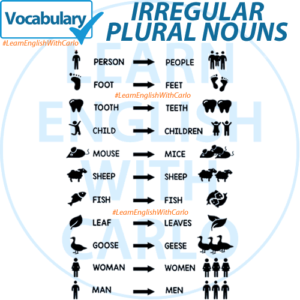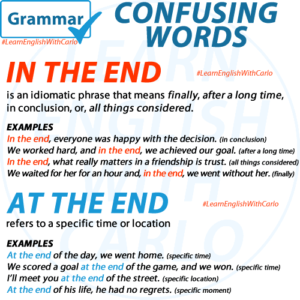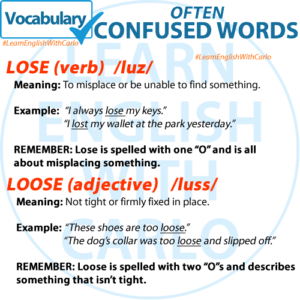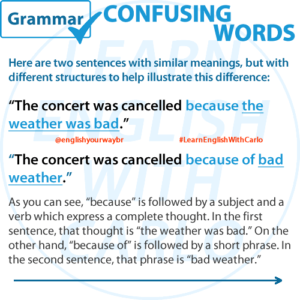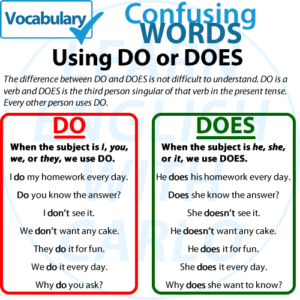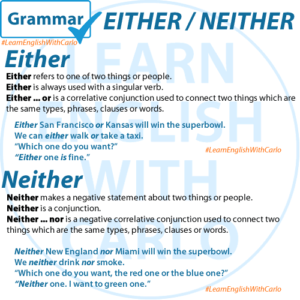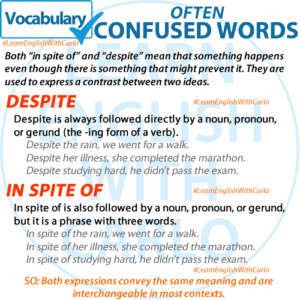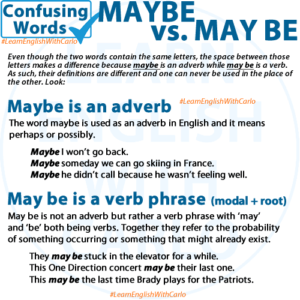VOCABULARY – Irregular Plural Nouns Most nouns in English are made plural by adding an ‘s’ to the singular form. But there are some exceptions. Here are a few of the more common ones. REMEMBER: Always use the plural verb form with plural noun subjects. FOR MORE INFORMATION ABOUT IRREGULAR PLURAL NOUNS, CLICK HERE.
Category: CONFUSING WORDS
Permanent link to this article: https://englishyourway.com.br/vocabulary-irregular-plural-nouns/
May 24
GRAMMAR – AT THE END vs IN THE END
GRAMMAR – AT THE END vs IN THE END English learners often confuse the phrases at the end and in the end because they sound similar. However, their meanings and usage are distinct. Let’s break them down and look at some examples to help you use these phrases correctly. What Does AT THE END Mean? …
Permanent link to this article: https://englishyourway.com.br/grammar-at-the-end-vs-in-the-end/
Permanent link to this article: https://englishyourway.com.br/confusing-words-lose-vs-loose/
May 21
“Because” vs. “Because of”
What’s the difference between “because” and “because of”? In most cases, “because” is followed by a subject and a verb, and “because of” is typically followed by a single word or phrase. Here are two sentences with similar meanings, but with different structures to help illustrate this difference: “The concert was canceled because the weather …
Permanent link to this article: https://englishyourway.com.br/because-vs-because-of/
May 18
CONFUSING WORDS – DO vs. DOES
The difference between DO and DOES is not difficult to understand.DO is a verb and DOES is the third person singular of that verb in the present tense. Every other person in the conjugation uses DO. When the subject is I, you, we, or they, we use DO. I do my homework every day.Do you …
Permanent link to this article: https://englishyourway.com.br/confusing-words-do-vs-does/
Apr 22
Understanding SO, SUCH, and TOO in English
The words so, such, and too are often confused by English learners because they all express emphasis or intensity. However, they follow different grammatical patterns and are used in distinct ways. Let’s break it down with examples and explanations. 1. SO So is used with adjectives and adverbs to indicate a high degree, often followed …
Permanent link to this article: https://englishyourway.com.br/using-so-such-too-in-english/
Apr 20
GRAMMAR – Either & Neither
GRAMMAR – Either & Neither Either refers to one of two things or people. Either is always used with a singular verb. Either … or is a correlative conjunction used to connect two things which are the same types, phrases, clauses or words. Neither makes a negative statement about two things or people. Neither …
Permanent link to this article: https://englishyourway.com.br/grammar-either-neither/
Apr 18
DESPITE vs. IN SPITE OF
Both “in spite of” and “despite” mean that something happens even though there is something that might prevent it. They are used to express a contrast between two ideas. Structure Key Points to Remember Examples with Explanations Practice Exercise Ask your students to rewrite sentences using “in spite of” and “despite”: Visual Aid Create a …
Permanent link to this article: https://englishyourway.com.br/despite-vs-in-spite-of/
Mar 13
CONFUSING WORDS: Speak vs. Talk
SPEAK and TALK are almost synonymous and are generally interchangeable except in fixed expressions. Remember that the verb speak tends to be used in more formal or one-sided situations. Unfortunately, there is no simple or easy rule to follow. But there are a number of fixed expressions for both verbs. Always use SPEAK in these …
Permanent link to this article: https://englishyourway.com.br/confusing-words-speak-vs-talk/
Feb 13
GRAMMAR – MAYBE vs MAY BE
MAYBE vs MAY BE Even though the two words contain the same letters, the space between those letters makes a difference because maybe is an adverb while may be is a verb. As such, their definitions are different and one can never be used in the place of the other. Look: MAY BE (Verb Phrase) …
Permanent link to this article: https://englishyourway.com.br/grammar-maybe-vs-may-be/

